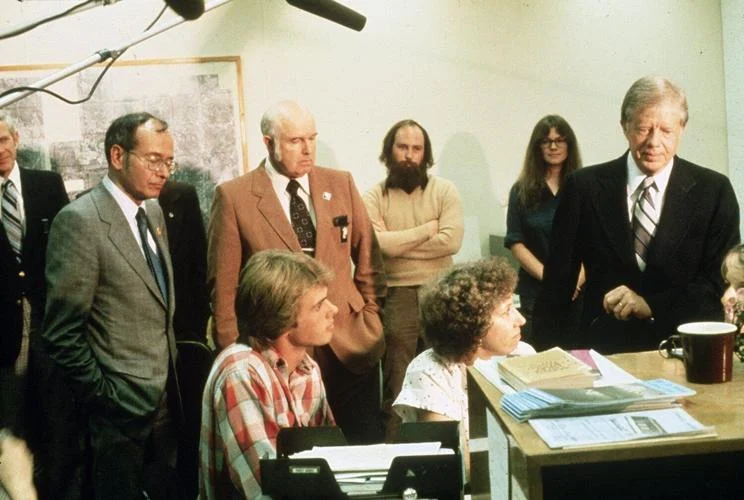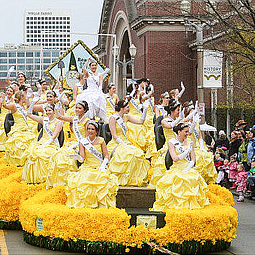Remembering President Jimmy Carter’s Connection to THIS Washington
December 30, 2024 at 5:16 p.m.
...by Josh Cohen / cascadepbs.org
Former President Jimmy Carter died Sunday at 100. The 39th President of the United States came to Washington state in 1976 to campaign for office and then visited as president after Mount Saint Helens erupted in 1980.
 Jimmy Carter, right, meets with U.S. Forest Service officials at the Gifford Pinchot National Forest to observe the response to the eruption of Mt. Saint Helens. Carter came to the area May 21 and 22 to survey the damage and pledge federal resources to relief efforts. Courtesy U.S. Forest Service.
Jimmy Carter, right, meets with U.S. Forest Service officials at the Gifford Pinchot National Forest to observe the response to the eruption of Mt. Saint Helens. Carter came to the area May 21 and 22 to survey the damage and pledge federal resources to relief efforts. Courtesy U.S. Forest Service.
The peanut farmer and former Naval officer entered politics in 1963 winning election to a seat in the Georgia State Senate. In 1970, he was elected as Georgia’s governor.
In August 1976, Carter’s campaign for president brought him to Seattle for a speech at the American Legion convention at the Seattle Center Coliseum (now Climate Pledge Arena). Carter had already beaten Washington’s U.S. Senator Henry M. Jackson in the Democratic primary and was now facing Republican incumbent Gerald Ford.
Speaking to a room of about 25,000 veterans just a year after the end of the Vietnam War, Carter said that he wanted to pardon Vietnam draft dodgers in an effort to move past the divisiveness of the war. According to reporting by KIRO7, the suggestion was met with boos and shouts from the audience. Carter followed through with a presidential pardon of draft dodgers on his second day in office.
Carter won the national election, but 52% of Washington voters chose Ford in ’76. Some of Carter’s priorities in office would mirror Washington’s contemporary policy direction. For example, despite his reputation for austerity, Carter proposed welfare reforms that included guaranteed basic income and a federal jobs guarantee. But the idea never received a vote in Congress.
When it came to foreign policy, Carter focused his efforts on human rights and peace. Marshaling the 1978 Egypt/Israel peace accords was one of his proudest accomplishments as president. Carter also helped strengthen the United States’ relationship with China.
Carter returned to Washington near the end of his presidency in the wake of the Mount Saint Helens eruption. On May 23, 1980, five days after the volcano erupted, Carter took a helicopter flight out of Portland to survey the damage.
After the flight landed at the Kelso, Washington, airport, Carter told reporters, “I don’t know if there is anything like it in the world. There’s nothing left by massive piles of mud and what used to be mountain ... It’s an unbelievable sight. There is nothing like this in the world,” according to a Washington Post article published at the time.
Carter returned to the Pacific Northwest a few weeks later to meet with federal disaster relief officials to discuss Saint Helens recovery efforts.
The June 10, 1980 entry from the White House daily diary reports that Carter stayed at the Olympic Hotel (now the Fairmont Olympic) in downtown Seattle. He started his day with a jog at Myrtle Edwards Park, though the diary misidentifies the park as “Myrtle Williams.” After meeting with disaster relief officials, Carter wrapped up his visit by addressing the annual meeting of the U.S. Conference of Mayors, which was held in Seattle that year.
Carter’s time in office ended not long after that visit to Seattle. His 1980 loss to Reagan also ushered in a wave of Republican victories in Washington state. Former Washington Attorney General Slade Gorton beat longtime incumbent Warren Magnuson in the race for U.S. Senate in 1980. Gorton was the most recent Republican to win one of Washington’s U.S. Senate seats. King County Executive John Spellman beat state Sen. Jim McDermott in the governor’s race and, like Gorton, was the last Republican to hold that office to date. Washingtonians chose Republican Ken Eikenberry as Gorton’s successor for Attorney General.
Carter’s post-presidential life was seen much more favorably by the American public than was his time in the White House. He spent several decades acting in diplomatic roles in the Middle East, Asia and Africa. He founded the Carter Center in 1982 to work on human rights issues.
He and his wife Rosalynn were famously ardent supporters of Habitat for Humanity, volunteering to help build homes and lending their reputations to the organization. Brett D’Antonio, CEO of the Seattle-King and Kittitas chapter of Habitat, said that to his knowledge Carter never worked directly with the local wing. But, D’Antonio said, “Their advocacy and awareness really made Habitat what it is today with the global reach that it has. They put us on the map, they’ve been our biggest advocates and the legacy really continues in their honor.”
Carter authored more than 30 books in his lifetime, ranging from memoirs about his time in politics and books about diplomacy to a children’s book illustrated by his daughter Amy. Carter’s 2006 book Palestine: Peace Not Apartheid and 2009’s subsequent We Can Have Peace in the Holy Land criticized Israeli policy in Palestine and argued that Israeli settlements in and control of Palestinian land are the primary obstacles to peace agreements. In a 2006 radio interview, Carter called Israel’s West Bank policy a worse apartheid than South Africa’s. Jewish groups, including the Anti-Defamation League, criticized the book and Carter for being antisemitic.
Book tours brought Carter back to Seattle on several occasions, including book signings at University Bookstore in 2009 and Elliott Bay Books in 2014.
Carter is survived by his four children, 11 grandchildren and 14 great-grandchildren. He was preceded in death by Rosalynn, his wife of more than 77 years, who passed away in November 2023.
- - - - -
Editor's Note - More information about The Carter Center, which Jimmy Carter founded with his wife, Rosalynn: The Carter Center is an organization guided by a fundamental commitment to human rights and the alleviation of human suffering... it seeks to prevent and resolve conflicts, enhance freedom and democracy, and improve health. Some accomplishments include reducing the incidence of Guinea worm disease by 99.99%, observing 125 elections in 40 countries to help establish and strengthen democracies, furthering avenues to peace throughout the world, helping to establish village-based health care delivery systems in thousands of communities in Africa, strengthen international standards for human rights, pioneering new public health approaches to controlling or preventing devastating diseases in Africa and Latin America, and advancing efforts to improve mental health care and diminish the stigma against people with mental illness. The Carter Center | Waging Peace, Fighting Disease & Building Hope
 (left to right) Jimmy Carter with his dog, Bozo in 1937; Jimmy Carter sledding at Camp David in 1978; Jimmy Carter at a Habitat for Humanity site (courtesy Habitat for Humanity)
(left to right) Jimmy Carter with his dog, Bozo in 1937; Jimmy Carter sledding at Camp David in 1978; Jimmy Carter at a Habitat for Humanity site (courtesy Habitat for Humanity)
Visit cascadepbs.org/donate to support nonprofit, freely distributed, local journalism.





